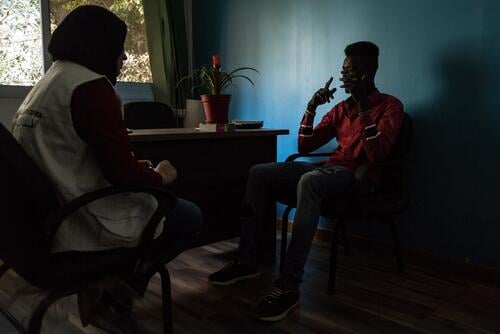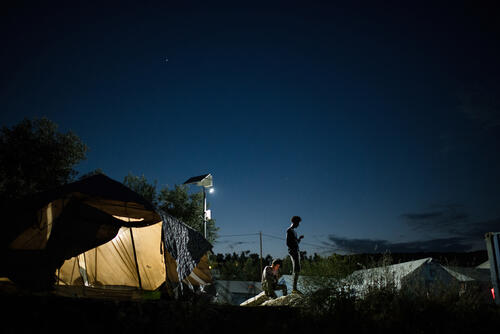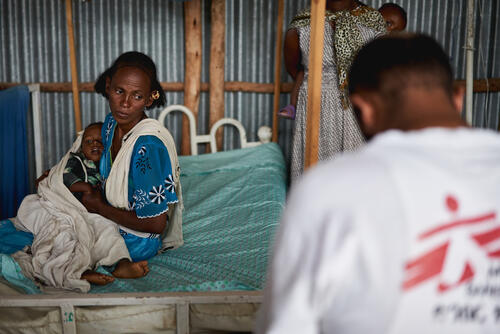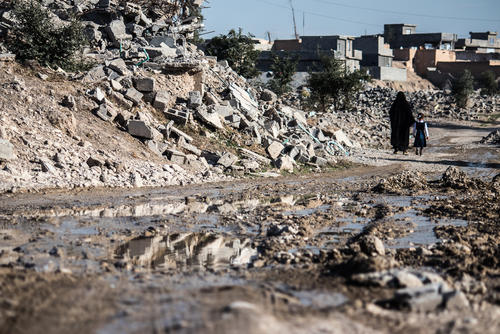Egypt is a key transit and destination country for migrants from Africa and the Middle East, many of whom have experienced immense difficulties along the way. The number of arrivals in Egypt has risen sharply in recent years due to conflict and instabilities in Syria, Iraq, Sudan, South Sudan, Eritrea, Somalia, Libya and several other countries.
Egypt’s migrant communities mainly live in Greater Cairo, Alexandria and Damietta. Many are waiting for their asylum requests to be processed. Many were also subjected to violence and exploitation in their home countries or during their journeys to Egypt, and have psychological problems and physical disabilities as a result.
In response to the specific needs of these communities, Médecins sans Frontières (MSF) runs an integrated healthcare centre in the Maadi neighbourhood of Cairo, which takes a novel, multidisciplinary approach to treatment.
The centre has developed an integrated range of services, including gynaecology, physiotherapy and mental health support, together with a social component to help people find housing, work and access to other social services. A group of health promoters and cultural mediators accompany patients through the numerous steps of their recovery process, making sure that the cultural aspect is taken into account in the provision of medical and social services.
From March to June 2018, MSF has treated more than 1,700 patients in Maadi. They include people from more than 10 different countries, as well as some Egyptian nationals with specific vulnerabilities requiring specialised care.
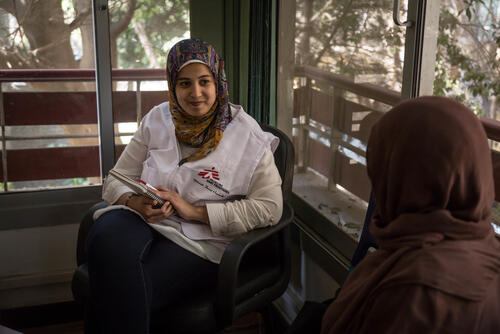
Interview with Christine Rufener, outgoing mental health activities manager at MSF’s integrated healthcare centre in Maadi, Cairo
Who are the patients coming to the MSF’s integrated healthcare centre in Cairo?
Many of our patients are migrants and refugees who have witnessed or experienced violence, trauma, or intense suffering in their countries of origin or during their journeys. Some of them have physical conditions or injuries that have long been ignored, yet have caused them a great deal of pain and functional impairment, such as back pain, stomach issues and/or headaches, that in turn can result in an inability to work or take care of one’s family. On the psychological side, the wounds are invisible. The majority of our patients come with symptoms of trauma: disturbing thoughts, nightmares and other sleep problems, panic attacks or chronic pain symptoms, depression and anxiety, fear and worry, and feelings of hopelessness and worthlessness. The hopelessness leads to many of our patients considering suicide as the only option to reduce their suffering.
What is the condition of these people once they arrive in Egypt?
Most of them are experiencing a life of limbo. They are in between their old life, which they were forced to flee for their own safety or well-being, and a new life that they hope to find – one where they can feel safe and free to raise a family and do satisfying work. And they face an asylum process that can stretch on for years. The struggles and difficulties they have experienced make them feel like their independence, their sense of self-worth, their very humanity and dignity have been severely weakened or taken away altogether. They feel a loss of control over their own lives. They have little influence on the asylum process or how to improve their lives while they wait.
What kind of care do these people receive in the Maadi clinic?
The Maadi project employs a multidisciplinary model of care that treats patients holistically. Psychologists and psychiatrists work alongside doctors, physical therapists and social workers to ensure that the patients’ health issues are addressed, both the physical and mental factors. Since physical pain affects emotional functioning and vice versa, tackling these issues in a comprehensive and complementary manner is pivotal.
Think of it like this: the right hand and the left hand working in unison, sharing information and thinking of solutions for our patient. The doctors assess the medical factors of the pain, and if no physical reasons are found, then the mental health team enters the scene to support the patient to process very difficult thoughts and feelings, manage symptoms of stress, and gradually work to rebuild their autonomy and strengthen their resilience. On top of that, our social workers look into other solutions for the patient that are beyond the physical and mental components – from looking into financial solutions to the patient and their family, to connecting the patient with local NGOs that can provide extra help.
The underlining component driving this multidisciplinary approach is that we are treating our patients as human beings. This simple and small act has profound effects, because it shows that the patients deserve dignity, that they are not merely a number on a medical case file, that their suffering is legitimate, and that there is hope, even if it is limited, for their recovery.
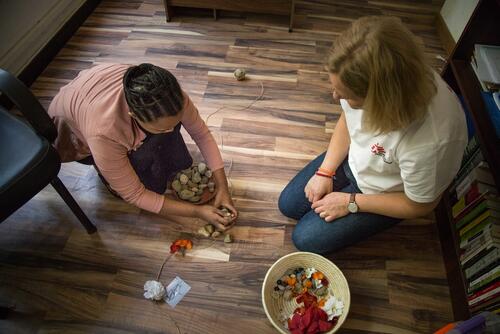
Can you share with us some examples of your work?
There are plenty of examples in my mind of cases we have had to handle over the years of my work in Cairo. One is of a patient in need of surgery on his leg to fix an old injury he obtained due to violence in his home country. He was immensely afraid of the surgery and the process. The entire team had to work together to address his needs to ensure his surgery was successful: the medical doctor prepared for and advocated treatment in an external hospital, the psychologist addressed the patient’s fears of the surgery and of being away from his family when he was at the hospital, the physical therapist prepared the patient to physically strengthen him, and the social worker addressed the patient’s financial concerns and how he could continue to assist his family during his recovery. Each of these issues needed to be addressed to ensure the patient’s treatment would be successful and help him gradually return to feeling complete and whole once again. Another example that comes to mind is of a young patient who comes to our centre and immediately enters with an immense smile on his face. He had faced, and continues to face, incredible struggles in his life, but for a brief moment, when he comes to the centre, you can tell that he feels safe, that this centre is there for him to get validation and to work on ways to cope and become stronger.
The impact on the families may be subtle but it is greatly significant. Many of the patients’ children, partners or relatives have found themselves trying desperately to care for their loved ones. Children, in particular, are burdened as they feel like they need to soothe the pains they witness in the faces of their mothers and fathers. However, through treatment, as the patient gradually recovers and regains their sense of independence – by simply moving their body without pain or feeling like they are in control and in charge of their lives – the family feels like they can move forward together and it lessens the challenges they collectively face.
What will you take with you from your mission in Cairo?
The number one lesson for me in this project is seeing and learning about our capacity for resilience and the importance of dignity: the patients we work with have lived lives so far from my own experiences, and yet they are among the strongest and bravest human beings I’ve ever known and witnessed.
In addition, I find our staff show similar strength and abilities to adapt to challenges and uncertainty. I could knock on any door at the centre and someone would help. It has taught me that when you do something that is difficult, doing it with a team makes it so much easier. I joined MSF to learn about different cultures and to use my own knowledge and skills as a psychologist to help reduce human suffering. I’ve found, however, that my work is just as influenced by my personal values as it is by my professional skills. Treating people with dignity, with respect, and with honesty is what we should all aspire to do – and you don’t have to work for MSF to live and work that way.
What is your hope for the future of this project?
My hope is that the team can continue to develop their expertise in working with patients with complex needs here in Cairo. It is easy to get discouraged in our work, as we hear about and treat trauma and suffering on a daily basis. Yet despite this, and in addition to the major challenges and uncertainties they face, our team is full of highly motivated, generous and talented staff, who are dedicated to the MSF principles and work hard to enable our patients to find healing, strength and recovery. The Maadi project has provided thousands of people with dignity and hope, and that is the humanitarian spirit at its core.
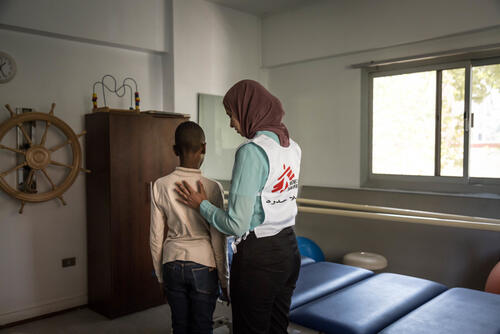
Initially, I was afraid to talk about my past. I wasn’t ready to recall all that had happened to me [...] but now I have resumed my strength and self-confidence.Faheema,* a young Sudanese woman living in Cairo
Testimonies from beneficiaries of the integrated healthcare centre in Maadi, Cairo
Amadi,* a young Ethiopian man living in Cairo
“I couldn’t work because of my injury and I didn’t have any assistance or support. Often I had thoughts of killing myself. I felt alone, in pain and powerless to go on with my life [...] I knew I couldn’t stay in that condition […]. Eventually I learned about MSF. I came directly and booked an appointment. I started treatment, and gradually I felt like I had been reborn. No one knew until then what had happened in my life. I told my doctor my story; she listened to me and understood my suffering. I received treatment and then she referred me to the psychologist and the physiotherapist. I was supposed to undergo surgery but I declined, so my physiotherapist gave me a lot of exercises to help improve my functionality and reduce my pain. […] My psychologist worked on my strengths and weaknesses. After four months of treatment my life had completely changed. I was able to take over my life again. Empowered, I started searching for a job and now I’m working trying to help others in need […]. My doctors treated me and now I can also help others through my work. This change in my life happened because of MSF. Thank you.”
Faheema,* a young Sudanese woman living in Cairo
“I was feeling that my life was in the dark. Before, I couldn’t handle or solve problems. I was weak and couldn’t even deal with the simplest social interactions. […] For five months, I felt I was suffocating. Many times I hoped I was invisible and often struggled with internal battles: Am I right or did I actually do something wrong? I was depressed and had given up. All these bad feelings changed completely with MSF, which gave me the strength to go on with my life. My psychologist would sit with me, and in every session we would talk about making small adjustments in my daily life. Every time I could feel that there was a small improvement. Initially, I was afraid to talk about my past. I wasn’t ready to recall all that had happened to me. When I started the sessions, I thought: ‘Why didn’t I come earlier?’ It felt as if I had gone to someone with my entire burden, all my suffering being in a sealed box, but eventually I started to relax. After every session, I started opening up and longing for the next session. My doctor helped me to regain my feeling of intimacy. I used to be afraid of the dark and the noises in the dark, but now I have resumed my strength and self-confidence. You know, I couldn’t cry before. Now I feel these happy tears will clear the road in front of me. My tears can fall because I feel the trust. I feel safe. […] Now I am able to tell the world: ‘If a person doesn’t speak out on what is going on inside of her, no one can help. No matter how bad our encounters are in life, there is always light at the other side.’”
*These testimonies were collected on 5 July 2018, and the patients’ names have been changed for confidentiality reasons
MSF started working in Egypt in 2010. MSF continues to engage in discussions with the Egyptian Ministry of Health and Population and national medical institutions regarding partnership projects in key public health areas, and has offered to contribute technical medical expertise to existing initiatives.



